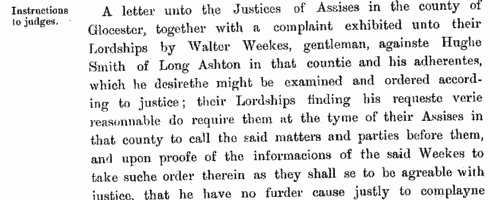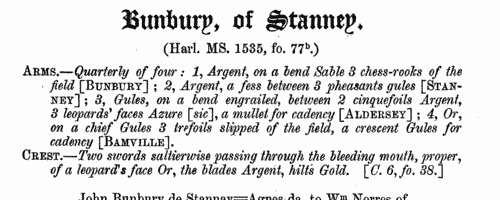Bavant Surname Ancestry ResultsOur indexes 1000-1999 include entries for the spelling 'bavant'. In the period you have requested, we have the following 5 records (displaying 1 to 5):
Buy all | |
| Get all 5 records to view, to save and print for £18.00 |
These sample scans are from the original record. You will get scans of the full pages or articles where the surname you searched for has been found.
Your web browser may prevent the sample windows from opening; in this case please change your browser settings to allow pop-up windows from this site.
Charter Rolls
(1050-1326)
This abstract of the surviving charter rolls for 1300 to 1326, in the reigns of kings Edward I and II, was prepared by C. G. Crump and A. E. Stamp and published in 1908. The charter rolls not only recorded royal grants of lands, liberties and offices, but also enabled landowners to have their existing charters, their deeds of title, registered by the process of inspeximus and confirmation. After the Statute of Mortmain of 1279, this was of particular importance to religious houses, now greatly restricted in their ability to receive new donations of land, and anxious to prove title to their ancient property. Consequently, many charters of great age were copied onto the charter rolls.BAVANT. Cost: £4.00.  | Sample scan, click to enlarge

|
Grantees of offices, commissions and pardons
(1350-1354)
The Patent Rolls are the Chancery enrolments of royal letters patent. Those for the 24th to the 27th years of the reign of king Edward III (25 January 1350 to 24 January 1354) were edited for the Public Record Office by R. F. Isaacson, and published in 1907. The main contents are royal commissions and grants; ratifications of ecclesiastical estates; writs of aid to royal servants and purveyors; and pardons. BAVANT. Cost: £2.00.  | Sample scan, click to enlarge

|
Liegemen and Traitors, Pirates and Spies
(1580-1581)
The Privy Council of queen Elizabeth was responsible for internal security in England and Wales, and dealt with all manner of special and urgent matters
BAVANT. Cost: £4.00.  | Sample scan, click to enlarge

|
Cheshire gentry and their ancestors
(1580-1613)
Richard St George, Norroy King of Arms, and Henry St George, Bluemaster Pursuivant of Arms, of the College of Arms, conducted a heraldic visitation of Cheshire in 1612 and 1613, recording pedigrees of gentlemen claiming the right to bear coats of arms. A copy of their visitation was elaborated by the addition of other Cheshire pedigrees in Harleian Manuscript 1535: and this manuscript was edited by sir George J. Armytage and John Paul Rylands for publication by the Harleian Society in 1909. It has a large number of pedigrees of Cheshire gentry, with a few brief abstracts from early documents; and the pedigrees of some offshoots from old Cheshire stocks which had taken root in other counties. The pedigrees largely relate to the period back from 1613 to the previous visitation of 1580, but there is also some older material, particularly back into the 15th century. In most cases each pedigree is prefixed by a heraldic description of the coat of arms. The printed volume also includes (pages 1 to 4) a list of Cheshire men who disclaimed the right to bear a coat of arms at the 1613 visitation, taken from Harleian Manuscript 1070.BAVANT. Cost: £4.00.  | Sample scan, click to enlarge

|
Tradesmen of Chester
(1392-1805)
Lists of admissions of freemen of the city of Chester from the earliest surviving records to 1805 were compiled by J. H. E. Bennett and published by the Lancashire and Cheshire Record Society from 1906. These lists were extracted from the mayoral yearbooks (dating back to 1392) and twelve freemen's rolls covering 1538 to 1612 and 1636 to 1805; and a list of admissions for 1505-1506 in Harleian MS 2105 (British Library). The record does not become more or less continuous until about 1490: in all, 12,426 freedoms are recorded. Freedom of the city, necessary to practise a trade in the city, could be obtained by birth (in which case the father's name and occupation are usually given); by apprenticeship to a freeman (the master's name and occupation being given); or by order of assembly. Both the freemen and the masters listed are indexed here. The main abbreviations used are: B, freedom taken up by right of birth; I, freedom taken up by right of indenture; M. B., Mayor's Book; *, freedom granted by order of assembly.BAVANT. Cost: £4.00.  | Sample scan, click to enlarge

|
Research your ancestry, family history, genealogy and one-name study by direct access to original records and archives indexed by surname.







